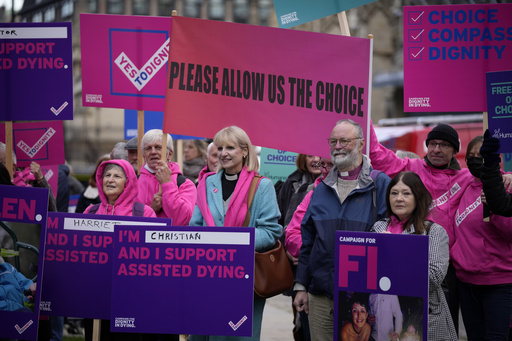
LONDON — A proposed piece of legislation aimed at legalizing assisted dying in the United Kingdom is set to be introduced in Parliament on Wednesday, offering the first opportunity for a discussion in the House of Commons on this contentious issue in nearly ten years. This development follows several unsuccessful attempts to modify the existing legal prohibition through court challenges.
Labour MP Kim Leadbeater is spearheading the initiative to present a bill that would permit terminally ill individuals in England and Wales to seek assistance from physicians in ending their lives. The specifics of the legislation are expected to be disclosed later this month in advance of a parliamentary vote.
Prime Minister Keir Starmer has committed to allowing MPs a “free vote” on the matter, implying that they will not be required to vote strictly along party lines. Starmer had previously supported a similar bill in 2015 and believes there are valid reasons to reconsider the current regulations surrounding assisted dying.
Leadbeater emphasized the need for robust protections in the legislation, stating unequivocally that there are safeguards to prevent vulnerable groups—such as those with disabilities or mental health issues—from being coerced into ending their lives. She highlighted the importance of getting the legislation correct to ensure necessary safeguards are implemented.
The proposed bill is anticipated to bear resemblance to an assisted dying proposal that was put forth in the House of Lords earlier this year, which has encountered slow progress. Although the House of Lords, composed of appointed members, reviews and modifies laws passed by the elected House of Commons, bills initiated there rarely become law.
The earlier bill in the House of Lords limits assisted dying to individuals forecasted to live six months or less, requiring approval from the High Court and the endorsement of two doctors, among other stipulations.
Esther Rantzen, the founder of a charity dedicated to children in the UK, who is currently facing lung cancer, has urged supporters to reach out to their local MPs. “All we are asking for is the right to choose,” she stated, adding that, lacking a legal alternative in Britain, she intends to seek assisted suicide in Switzerland, where such practices are permitted for international visitors.
However, opponents, including actress Liz Carr, a disability rights advocate, express profound concerns, arguing that attempts to change the law could pose risks to vulnerable individuals.
Assisted suicide—where patients consume a physician-prescribed lethal substance—is already permissible in several countries including Australia, Belgium, Canada, and parts of the U.S., each with its unique qualifying regulations.
Naomi Richards, an anthropologist at the University of Glasgow who focuses on death and dying, remarked on the potential demand for assisted dying, suggesting that it would likely be limited unless the public lobbied for broader access. She believes these debates will evolve in a democratic society over time.
Furthermore, Trudo Lemmens, a health law and policy professor at the University of Toronto, stresses that the immediate focus in Britain should be on rectifying healthcare disparities across the nation. He noted that in Canada, following the legalization of assisted dying in 2016, many individuals sought medical assistance in dying due to feelings of being burdensome to others.
Lemmens cautioned about the risk of pressure to widen the scope of assisted dying beyond initial legislation, reinforcing the need for a thorough examination of the implications witnessed in other countries before any moves towards legalizing physician-assisted end-of-life options.
